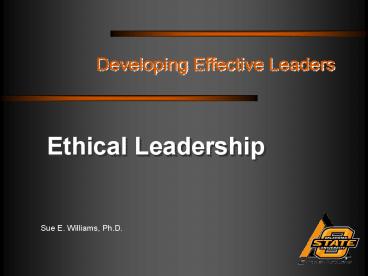Developing Effective Leaders - PowerPoint PPT Presentation
1 / 27
Title:
Developing Effective Leaders
Description:
Integrate principles of leadership and principles of ethics. ... Derived from Ayn Rand. 8. Case Study. So, do you. lie on the application? Six Pillars of Character ... – PowerPoint PPT presentation
Number of Views:357
Avg rating:3.0/5.0
Title: Developing Effective Leaders
1
Developing Effective Leaders
- Ethical Leadership
2
Objectives
- Integrate principles of leadership and principles
of ethics. - Enhance the capabilities of community leaders to
recognize and act according to their ethical
beliefs. - Provide a forum to discuss how to build and
maintain an ethical society.
3
Definitions of Terms
VALUES
Core beliefs or desires that guide and motivate
attitudes and actions.
MORALS
Customs and personal beliefs of individuals about
what is right and wrong.
Standards of conduct that indicate how one should
behave based on principles about right and wrong.
ETHICS
Source Scheffert and Hamersly 1993
4
What is Ethics?
- Ethics is not about the way things are
- It is about the way things OUGHT to be.
Source Josephson Institute of Ethics
5
Three Qualities of Ethical Leadership
6
Ethics is Character and Courage
- Ethics is about character and courage and how we
meet the challenge when doing the right thing
will cost more than we want to pay. - Michael Josephson
Source Josephson Institute of Ethics
7
Ethics is Values
- Ethics is a code of values which guide our
choices and actions and determine the purpose and
course of our lives. - Derived from Ayn Rand
Source Josephson Institute of Ethics
8
Case Study
- So, do youlie on the application?
9
Six Pillars of Character
- Trustworthiness
- Respect
- Responsibility
- Justice Fairness
- Caring
- Civic Virtue
- These core ethical values transcend cultural,
religious, and socio-economic differences.
Source Josephson Institute of Ethics, Aspen
Declaration, 1992
10
The Commonwealth
Commonwealth
11
Ethical Decision Making
- An ethical perspective is having the ability to
- Be sensitive to ethical issues.
- Make reasoned judgments.
- Have the motivation to act ethically.
- Follow through with action.
- Look back and learn from the situation.
Source Scheffert and Hamersly 1993
12
Aiming for Ethical Decisions
If you aim for the outer rim,
Spirit Purpose
Minimal Compliance
You will inevitably miss the target.
Source Josephson Institute of Ethics
13
Ethical People
An ethical person often chooses to do more than
the law requires and less than the law allows
there is a difference between what you have a
right to do and what is right to do. Justice
Potter Stewart
14
Competing Values
- You might have to choose between
- Instead of
Caring
Honesty
Responsibility
15
Classic Ethical Conflicts
- Short-term vs. Long-term
- Principle vs. Expediency
- Self-interest vs. Others
- Conflicting loyalties
16
Ethical Decision-Making Process
- Perceive
- Clarify
- Select
- Act
- Reassess
17
Ethical Decision-Making Models
- Personal Warning System
- Bell, Book, and Candle
- M.O.R.A.L.
18
Your Personal Warning System
The GOLDEN RULE Do unto others as you would
have others do unto you.
Source Josephson Institute of Ethics
19
Bell, Book, and Candle
- Listen for the bells warning you.
- Check to see if there are any laws, regulations,
or rules. - How will your decision look in the light?
20
M. O. R. A. L. MODEL
- Massage the dilemma
- Outline Options
- Review criteria and resolve
- Affirm position and act
- Look back
Patricia Crisham
Source Scheffert and Hamersly 1993
21
Practicing Ethical Decision Making
- Case Study 1 The 20 Bill
- Case Study 2 The Youth Group Sponsor
- Case Study 3 The Caring Board of Directors
22
Common Rationalizations
- If its necessary, its ethical!
- If its legal and permissible, its proper.
- I was just doing it for you!
- Im just fighting fire with fire.
- It doesnt hurt anyone.
- Everyone does it!
- Its okay if I dont gain personally.
- Ive got it coming!
- I can still be objective.
Source Josephson Institute of Ethics
23
Ethics is a Name
- Ethics is the name we give to our concern for
good behavior. We feel an obligation to consider
not only our own personal well-being, but that of
others and of society as a whole. - Dr. Albert Schweitzer
24
Ethics is Hope
- When people accept responsibility for their own
conduct and for the well-being of others, ethics
serves to stabilize society. Ethical leadership
is the antidote to despair and cynicism that is
crushing our spirit and clouding our future.
Ethics is our hope. - Gary Edwards, Ethics Resource Center
25
Why Worry about Ethics?
- Leadership is the investment of trust into people
who serve the common good. - It creates value.
- It refines and develops services that enrich our
lives. - Leadership is naturally ethical.
Source Scheffert and Hamersly 1993
26
Why Worry about Ethics?
- What people look for in others for leadership
- Honesty
- Fair-mindedness
- Caring
- We appoint, elect, and encourage leaders,
expecting them to serve the public reliably.
Source Kouzes Posner, 2002
27
Final Thought
- If you want to know how to live your life, Think
about what you would like people to say about you
after you die. - Then, live backwards.
- Josephson Institute
Source Josephson Institute of Ethics































